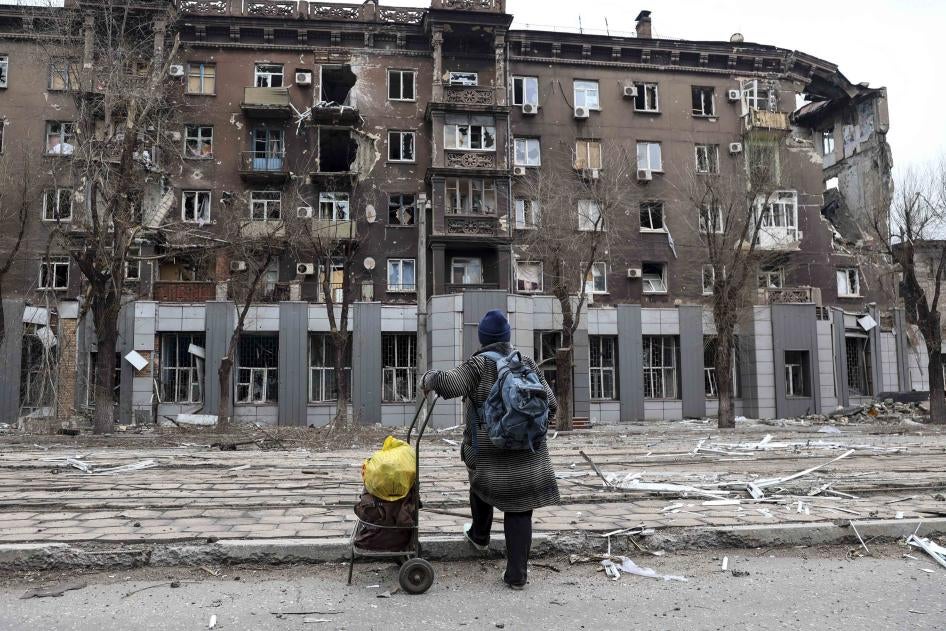(The Hague) – Governments and international bodies that have made unprecedented efforts to promote justice for crimes committed since Russia’s full-scale invasion of Ukraine demonstrate the ability to deliver on victims’ rights when political will is high. Human Rights Watch issued a question-and-answer document on the international justice response to the Russia-Ukraine war.
On March 17, 2023, International Criminal Court (ICC) judges issued arrest warrants for Russian President Vladimir Putin and the children’s rights commissioner in his office, Maria Lvova-Belova. The judges found reasonable grounds to believe that Putin and Lvova-Belova bear criminal responsibility for the alleged unlawful deportation and transfer of Ukrainian children from occupied areas of Ukraine to Russia.
“The ICC warrant for Putin reflects an evolving and multifaceted justice effort that is needed elsewhere in the world,” said Balkees Jarrah, associate international justice director at Human Rights Watch. “Similar justice initiatives are needed elsewhere to ensure that the rights of victims globally – whether in Afghanistan, Ethiopia, Myanmar, or Palestine – are respected.”
The question-and-answer document covers various aspects of the international justice response to the Russia-Ukraine conflict, including developments before the ICC and in Ukrainian and other national justice systems. It is intended to help provide further information to governments and other actors engaged in international justice efforts in Ukraine and globally to understand key features of this response as it continues to develop.
ICC judges issued the arrest warrants for Putin and Lvova-Belova following an application by the ICC prosecutor on February 22. The arrest warrants were issued in the context of the ICC prosecutor’s ongoing Ukraine investigation, which he opened on March 2, 2022. Because the ICC has no police force of its own, it relies on national authorities to make arrests on its behalf. ICC member countries are obligated to cooperate in securing the surrender of those wanted by the court.
Because Russia is not a member of the ICC, its authorities are not bound to cooperate with the court. However, under the court’s rules governing its jurisdiction, the ICC prosecutor has a mandate to impartially investigate allegations of crimes committed in Ukraine by all parties to the conflict, regardless of the nationality of the person allegedly responsible. The ICC treaty applies to everyone within the court’s jurisdiction regardless of their official capacity.
Ukraine is also not a member of the ICC, but it accepted the court’s jurisdiction over alleged crimes committed on its territory since November 2013, and in doing so, the obligation to cooperate with the court.
ICC member countries should urge Ukraine to join the ICC. That would allow Ukraine to exercise full membership rights in the Assembly of States Parties, the body of ICC member countries. Ukraine should also fully align its national legislation with the ICC treaty and international law. National and international civil society groups have for years pressed the Ukrainian government to join the court.
The armed conflict in Ukraine since Russia’s full-scale invasion on February 24, 2022, has been disastrous for the civilian population. Russian forces have committed numerous violations of international humanitarian law, including indiscriminate and disproportionate bombing and shelling of populated areas. Many attacks have been with explosive weapons with wide area effects, including cluster munitions, unguided aerial bombs, and guided missiles.
In areas they occupied, Russian or Russia-affiliated forces have committed apparent war crimes and potential crimes against humanity, including summary executions, torture, sexual violence, enforced disappearances, and the pillage of art and cultural artifacts. Civilians who attempted to flee areas of fighting faced terrifying ordeals and numerous obstacles. In some cases, Russian forces forcibly transferred significant numbers of Ukrainian civilians to Russia or Russian-occupied areas of Ukraine, which is a war crime.
Both Russian and Ukrainian forces have used banned antipersonnel landmines. A recent United Nations report found that both forces have been responsible for apparent summary executions and mistreatment of prisoners of war.
In addition to the ICC’s ongoing investigation, governments and others have initiated various accountability efforts to address serious crimes in Ukraine. Judicial officials in several countries have opened criminal investigations. And the UN Human Rights Council voted in March 2022 to establish an international commission of inquiry to document war crimes and human rights abuses in Ukraine.
Ukrainian authorities have also been conducting their own criminal investigations. To support these efforts, many governments have offered Ukraine assistance to bolster its judicial capacity. Meanwhile, domestic and international civil society groups have documented violations as they occur. The unprecedented outpouring of support around justice in Ukraine is both an opportunity and a challenge for realizing justice for victims of serious international crimes, Human Rights Watch said.
During the past year, international bodies and governments have shown the value of developing a multilayered approach to providing impartial and credible justice for Ukraine. However, without effective coordination, there could be significant duplication of efforts and waste of financial and human resources with limited impact for victims and survivors, Human Rights Watch said.
The swift international response to the crimes committed in Ukraine also puts into sharp focus the unevenness and double standards in access to justice for victims of serious crimes elsewhere. This also threatens the legitimacy of justice when it is delivered. All governments should work to strengthen the global system of accountability and counter double standards for serious international crimes, Human Rights Watch said.
“The incredible efforts poured into ensuring justice in Ukraine have shown the importance of a concerted international response,” Jarrah said. “The support for accountability efforts for Ukraine should become a paradigm for the international community’s response to crises and conflicts elsewhere in the world.”







